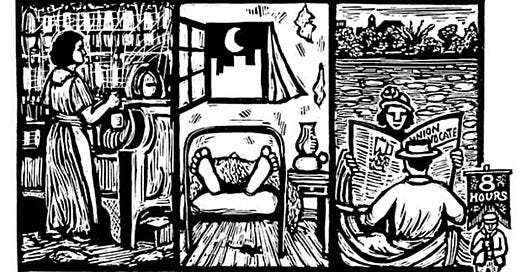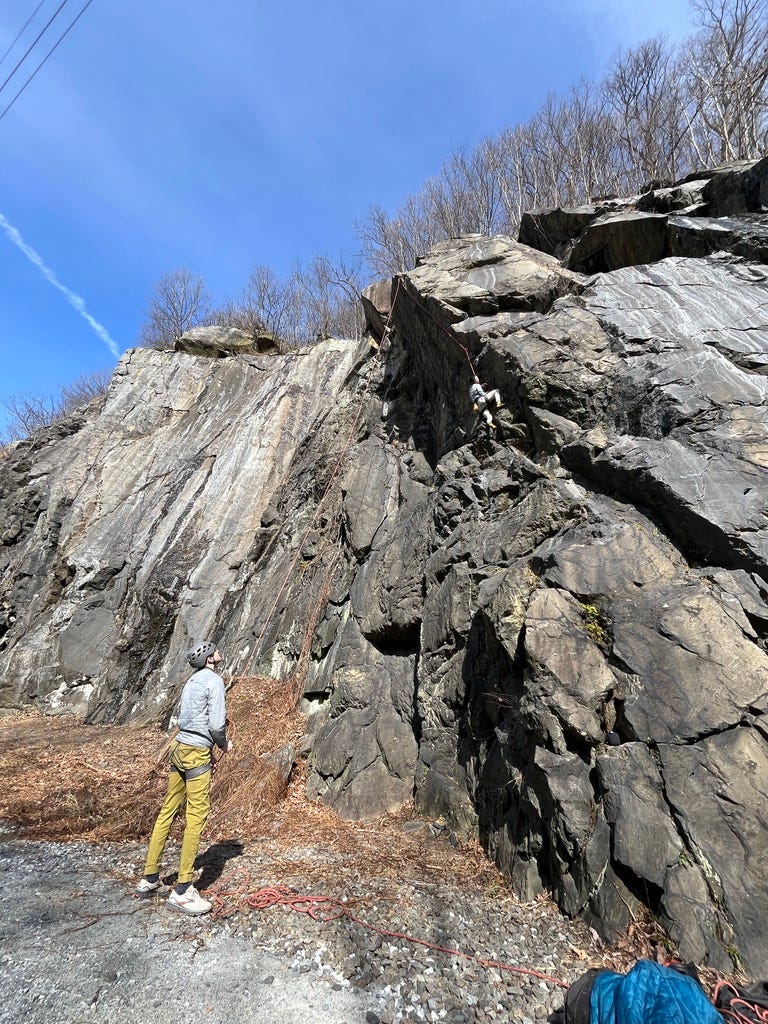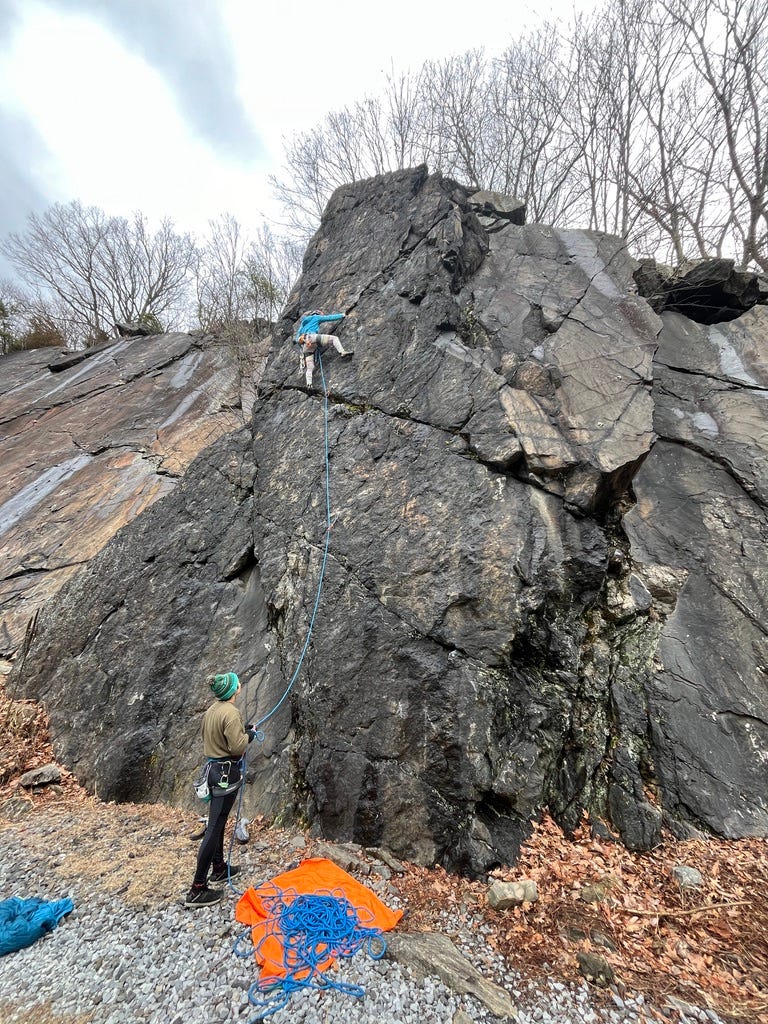"I'm just here so I won't get fined"
On homeownership as shelter from market forces and financial precarity
It’s beautiful outside today. Absolutely ideal running weather, specifically: sunny with crisp breezes, temperature in the high 50s/low 60s.
I don't wanna go to work today
Feeling good, I don't wanna waste it
I don't wanna go to work today
Sun is out and I wanna taste it
So sings Remmi in “Minimum Wage,” and so complains nearly every one of us with 9-5 jobs and bills to pay…
The old labor movement slogan — 8 hours for work, 8 hours for rest, 8 hours for what we will — was a massive development, in its time, over and against the previously-normal 12-hour (or longer) work day. But the slogan still, in a general sense, acknowledges that a massive chunk of our time is bound to the demands of our jobs. We must work to survive.
Have you heard the tale of Bartleby the Scrivener? or of Marshawn Lynch’s press conference before the Super Bowl? Have you ever participated in a strike, either official or wildcat? Do you follow Tricia Hersey and the Nap Ministry? When was the last time you opted out of labor?
This state of being dependent on not just our labor but also on the whims and attitudes of those who control our labor — our bosses, the government, an algorithm, etc. — is especially acute for people living with disabilities or any other condition that renders them lesser-than in the eyes of the powerful. “Precarity” is the term for this experience, of living in contingency — “today I may be able to work and earn enough resources to survive and provide, but I can’t count on things staying the same tomorrow.” Precarity is a condition we don’t choose, but also can’t opt out of: it is given to us by our situation in society.
And the biggest contributor to precarity, for most of us, is our housing bill. Whether rent or a mortgage, the housing bill is typically our largest single financial commitment, and the one that has cascading effects on how we govern our time and priorities. Spending over 30% of one’s income on housing is a condition known as being “cost-burdened,” and nearly one third of all American households -- over 42 million -- were cost-burdened in 2022. But to not pay for housing is not an option: “Rent eats first,” goes the saying. As explored in works like Matthew Desmond’s book Evicted, losing one’s home is not equivalent to not having enough food or having a utility shut off. Homelessness is a platform-level hardship, one that affects all other life priorities in a cascading avalanche. If you lose your home, everything else starts to fall apart as well — and rapidly. We must have stable housing. And to pay for it, we must work. And thus we might not be able to take advantage of sunny days like today when they come.
Gimme shelter
The dream, of course, would be freedom from this precarity. To be able to work and live and enjoy sunny days without fear of being cast onto the street or collapsing under a mountain of debt. Humans originally developed shelter and housing as a means of security against the precarity of being exposed to the elements of snow, rain, and cold. What if we could develop forms of shelter against the precarity of being exposed to the market and capitalism and other social forces that threaten us?
Hear me out on this… could housing also do that for us? Could housing be a form of shelter against social threats in the same way it shelters us from natural ones? Specifically, could homeownership save us from some of the precarity of low wages and high bills?
Essentially, if you own your home outright then that’s one less monthly bill to pay. And with one less bill to pay, that’s a little more freedom to choose what labor you will (or won’t) commit yourself to.
It hopefully is no surprise to you that renting is especially expensive and risky, in a financial sense. Sure, mortgages can often exceed the cost of rent. But in the long run, the mortgage is always better. Why? Because in a 30-year fixed-rate mortgage (the normal, standard mortgage for most buyers), the first payment you make will be exactly the same number as the last payment you make. Given the realities of inflation and your wage/earning increase (hopefully!) over those 30 years, then that first mortgage payment will be the most painful payment you’ll ever have to make. It’ll only get easier from there. Rent, on the other hand, increases at roughly the same rate as inflation. Rent is designed to extract a similar amount of your purchasing power across time, while a mortgage payment is designed to be easier and easier as time goes on. And if you play your cards right and pay off the house early, owning it outright? Well then we’re cooking with gas.
I’m here and I feel fine
When you own your own home outright, you are invisible to the housing market. Your home can’t be repossessed by the bank, your mortgage won’t become unmanageable if your income decreases, your landlord can’t decide to not renew your lease. That place will allow you to dwell and belong no matter what anyone else says.1
When financial advisors recommend “asset diversification” in sheltering your money from the storms of a capricious market, they generally mean spreading your investments across different classes of stocks and bonds. Sure, that strategy might bring “dividends” that pay out in having financial flexibility and options. But owning your own home has one major advantage over that option: it is simple. And maybe you, like me and so many others, find yourself exasperated with the strain of navigating an increasingly complex modern world. Maybe you are looking to simplify and specify your life, rather than to complexify and diversify. And towards that end, owning your own home is a straightforward and elegant solution. And which of your other investments let you live in them while they latently increase in value?
It’s worth noting that this advice is, for my welfare as a realtor, pretty counterproductive. I will make more money the less stably housed the world is. My job depends on you being unhappy with where you currently live. The more people want to move, the more money realtors make.2
This is not an argument for a “starter home” or a provisional investment in real estate that will cash out to a bigger and better “forever” home at some other unspecified future date, but an invitation to look at the process of buying a home as a step towards simple stability. This is an invitation to find a home — maybe a significantly more affordable home than you could afford — that lets you rest, unequivocally, in a world that constantly asks you to give more and more and more. “Real estate” is the name we give to the process of treating houses as means towards some other end; the work I’m describing here is to find a home for real and true inhabitation. Find yourself a place you can rest, and there you will find freedom.
Climbing on the weekday
I’m coming up on the end of my second full year of rock climbing regularly, woot woot! Mostly I climb in a local gym, but Hana and I have also been getting outside more frequently to nearby cliffs to climb on the real stuff. It’s time-consuming and effortful: you really need to commit a full day to the trip, given how remote some of these cliffs are in Pennsylvania. And having a job that gives me flexibility mid-week (Wednesday is usually my least-busy, most-flexible day) means that I’ve been able to climb outdoors on days when the crag is especially uncrowded. Lovely!
If you’re at all interested in climbing with me, let me know! It’s surprisingly easy for beginners (you wear a harness, and if you’re on the struggle bus you can just hang from the rope). But a significant component of the joy for me comes from knowing I’m actually able to choose to do this and not be at risk of not paying my bills. A simple life is no easy feat, but it is worth pursuing.
There is, of course, the exception of eminent domain. But let’s tackle one issue at a time, shall we? Addressing the police power of the state is a separate conversation, forgive me for not tackling it here.
I’m actually workshopping a series of newsletters in the style of The Screwtape Letters, where an elder vampire realtor advises a younger vampire realtor in how to ensure a constant flow of cash/blood from their home-searching and home-selling clientele… might be too grim. DM me/comment if you want to see it







